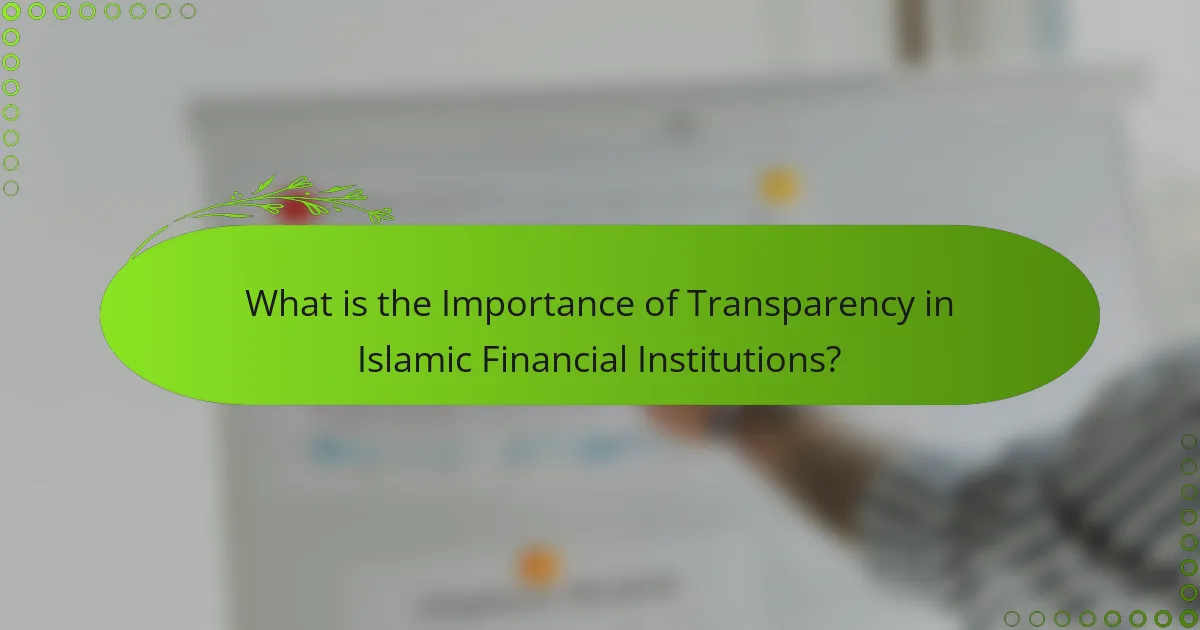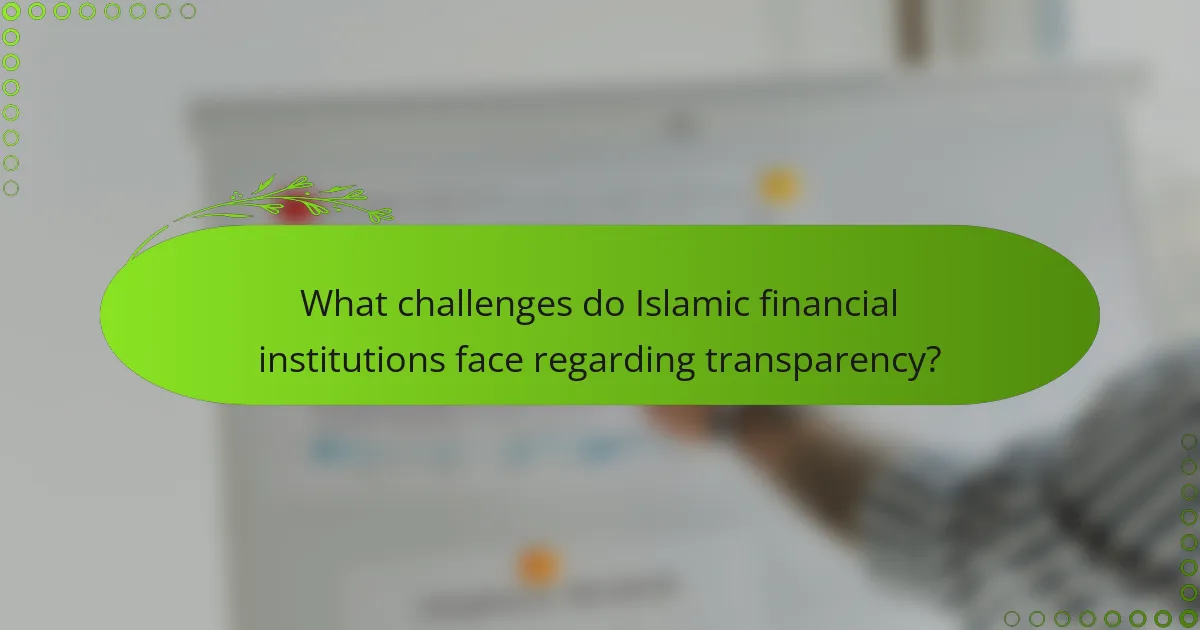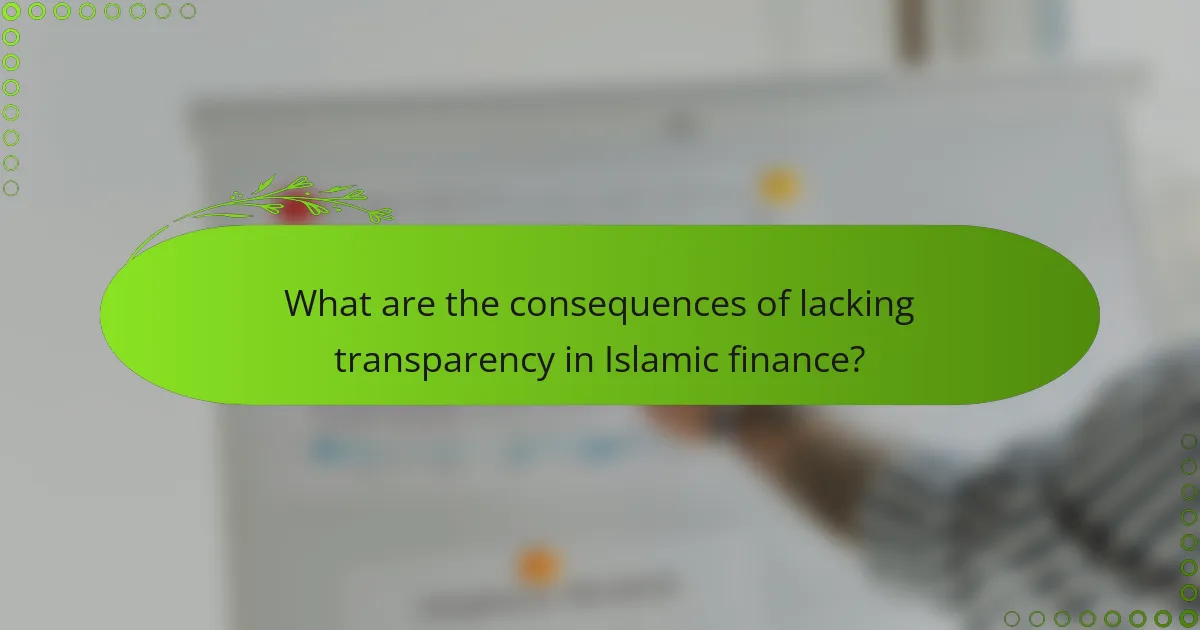
What is the Importance of Transparency in Islamic Financial Institutions?
Transparency in Islamic financial institutions is crucial for maintaining trust and accountability. It ensures that all financial transactions comply with Sharia law. Transparency promotes ethical behavior among stakeholders. It helps prevent fraud and mismanagement of funds. Clear communication of financial practices builds confidence among investors. Studies show that transparency can enhance financial performance. For example, the Islamic Financial Services Board emphasizes transparency as a pillar of good governance. This fosters a stable financial environment.
Why is transparency essential in Islamic finance?
Transparency is essential in Islamic finance to ensure compliance with Sharia principles. It fosters trust between financial institutions and their clients. Clear information about financial products prevents misunderstandings and promotes ethical transactions. Transparency also enhances accountability, as stakeholders can assess the adherence to Islamic laws. Research shows that transparency reduces the risk of fraud and promotes stability in financial markets. According to the Islamic Financial Services Board, transparency is a key factor in building investor confidence. This confidence attracts more participants to the Islamic finance sector. Ultimately, transparency aligns with the ethical foundations of Islamic finance, supporting fair and just economic practices.
What ethical principles underpin transparency in Islamic finance?
Transparency in Islamic finance is underpinned by several key ethical principles. These principles include honesty, fairness, and accountability. Honesty ensures that all financial dealings are conducted truthfully. Fairness emphasizes equitable treatment of all parties involved in financial transactions. Accountability requires institutions to take responsibility for their actions and decisions.
These principles align with Islamic teachings, which advocate for ethical conduct in all aspects of life. The Quran and Hadith emphasize the importance of justice and transparency in financial dealings. For instance, Quran 2:282 highlights the need for clear contracts and disclosure in transactions.
The adherence to these ethical principles fosters trust among stakeholders. It also enhances the credibility of Islamic financial institutions in the global market. Thus, transparency, rooted in these ethical principles, is crucial for the integrity and sustainability of Islamic finance.
How does transparency impact trust in Islamic financial institutions?
Transparency enhances trust in Islamic financial institutions by ensuring accountability and ethical practices. When these institutions operate transparently, they provide clear information about their operations and decision-making processes. This openness helps customers understand the compliance with Shariah principles. Studies indicate that transparency reduces the perceived risks associated with financial transactions. For example, a report by the Islamic Financial Services Board highlights that transparent disclosures foster consumer confidence. Trust is further strengthened when customers can access reliable information regarding fees and profit-sharing mechanisms. Overall, transparency is crucial for building lasting relationships between Islamic financial institutions and their clients.
How does accountability relate to transparency in Islamic finance?
Accountability in Islamic finance is intrinsically linked to transparency. Transparency ensures that financial practices are open and accessible, allowing stakeholders to understand operations. This openness fosters accountability by requiring institutions to justify their actions and decisions. When Islamic financial institutions are transparent, they build trust with investors and clients. Transparency also helps to mitigate risks associated with unethical practices. Evidence shows that higher transparency levels lead to better accountability outcomes. A study by the Islamic Financial Services Board highlights that transparency enhances stakeholders’ confidence. This relationship is crucial for maintaining ethical standards in Islamic finance.
What are the key accountability mechanisms in Islamic financial institutions?
Key accountability mechanisms in Islamic financial institutions include Shariah compliance, internal audits, and external audits. Shariah compliance ensures that all financial activities adhere to Islamic law. This is typically overseen by a Shariah board comprising scholars who provide guidance on compliance matters. Internal audits assess the effectiveness of risk management and governance processes. They help ensure that operations align with both Shariah principles and organizational policies. External audits provide an independent review of financial statements and compliance with regulations. They enhance trust among stakeholders by verifying the accuracy of reported financial performance. Collectively, these mechanisms promote transparency and ethical conduct in Islamic finance.
How do these mechanisms promote ethical practices?
These mechanisms promote ethical practices by ensuring accountability and fostering trust. Transparency in Islamic financial institutions allows stakeholders to access vital information. This access helps prevent unethical behaviors such as fraud or mismanagement. For instance, regular audits and disclosures create a culture of integrity. Studies show that institutions with high transparency levels experience lower instances of corruption. Furthermore, these mechanisms align with Islamic principles of fairness and justice. They encourage ethical decision-making among employees and management. Overall, transparency serves as a foundation for ethical conduct in financial practices.

What challenges do Islamic financial institutions face regarding transparency?
Islamic financial institutions face significant challenges regarding transparency. One major challenge is the complexity of Sharia-compliant products. These products often lack standardization, making it difficult for stakeholders to understand their structures. Additionally, there is a limited availability of comprehensive financial disclosures. Many institutions do not publish detailed information about their operations and risk exposures. This lack of information can lead to uncertainty among investors and customers. Furthermore, regulatory frameworks for transparency vary widely across regions. This inconsistency complicates compliance efforts for institutions operating in multiple jurisdictions. Lastly, cultural factors may influence the willingness of institutions to adopt transparent practices. In some regions, there is a preference for confidentiality over openness, which can hinder transparency initiatives.
What are the common barriers to achieving transparency?
Common barriers to achieving transparency include lack of regulatory frameworks, inadequate communication, and cultural resistance. Regulatory frameworks often fail to enforce transparency standards. This can lead to inconsistent practices among institutions. Inadequate communication can hinder the dissemination of information. Stakeholders may not receive crucial data needed for informed decision-making. Cultural resistance often stems from traditional practices that prioritize confidentiality. Many institutions may fear losing competitive advantage by sharing information. Moreover, limited technological resources can restrict access to transparency tools. Institutions may struggle to implement systems that promote open data sharing. Lastly, insufficient training for staff can lead to misunderstandings about transparency requirements. This can further perpetuate a cycle of non-compliance and opacity.
How do regulatory frameworks influence transparency in Islamic finance?
Regulatory frameworks enhance transparency in Islamic finance by establishing clear guidelines and standards. These frameworks ensure that financial institutions adhere to Sharia principles while promoting ethical practices. They require regular disclosures of financial information, which builds trust among stakeholders. For instance, the Accounting and Auditing Organization for Islamic Financial Institutions (AAOIFI) sets standards that enhance accountability. Compliance with these standards leads to improved reporting practices. Consequently, this transparency helps mitigate risks and fosters confidence in the Islamic finance sector. Overall, regulatory frameworks play a crucial role in promoting ethical behavior and accountability within Islamic financial institutions.
What role does cultural perception play in transparency challenges?
Cultural perception significantly influences transparency challenges in Islamic financial institutions. Different cultures have varying expectations regarding openness and accountability. In some cultures, transparency is viewed as a fundamental ethical requirement. In others, it may be seen as intrusive or unnecessary. These differing views can create friction in implementing transparent practices. For instance, Islamic financial institutions often operate in regions where traditional values prioritize confidentiality. This can lead to resistance against transparency initiatives. Additionally, cultural perceptions shape stakeholder trust. If stakeholders perceive transparency as a threat to their values, they may distrust the institution. Research indicates that cultural alignment enhances the effectiveness of transparency efforts. Therefore, understanding cultural perceptions is crucial for addressing transparency challenges.
What strategies can enhance transparency in Islamic financial institutions?
Enhancing transparency in Islamic financial institutions can be achieved through several strategies. Implementing robust governance frameworks is essential. These frameworks establish clear roles and responsibilities, ensuring accountability. Regular audits by independent third parties can also promote transparency. These audits provide an objective assessment of financial practices.
Additionally, adopting clear and consistent reporting standards is crucial. This allows stakeholders to understand financial statements easily. Engaging with stakeholders through open communication fosters trust. Transparency can be further enhanced by utilizing technology. Digital platforms can facilitate real-time access to information.
Moreover, training employees on ethical practices reinforces a culture of transparency. Research shows that transparency leads to improved stakeholder confidence. For instance, a study by the Islamic Financial Services Board highlights the positive impact of transparency on institutional reputation.
How can technology improve transparency and accountability?
Technology can improve transparency and accountability by enabling real-time data sharing and tracking. Blockchain technology provides an immutable ledger, ensuring that all transactions are recorded transparently. This reduces the risk of fraud and enhances trust among stakeholders. Digital platforms facilitate easier access to information, allowing stakeholders to monitor activities and decisions. Furthermore, data analytics can identify discrepancies and patterns, promoting accountability within organizations. Studies show that organizations using technology for transparency see increased stakeholder confidence and engagement. For instance, a report by the World Economic Forum highlights that blockchain can enhance governance in financial institutions by providing verifiable records.
What best practices can Islamic financial institutions adopt for better transparency?
Islamic financial institutions can adopt several best practices for better transparency. They should implement clear disclosure policies regarding financial products and services. This includes providing detailed information about fees, risks, and profit-sharing mechanisms. Regular audits by independent third parties can enhance credibility. Additionally, institutions should publish comprehensive annual reports that outline financial performance and governance practices. Engaging stakeholders through open communication channels fosters trust. Training staff on ethical practices ensures compliance with transparency standards. Lastly, leveraging technology for real-time reporting can improve accessibility to information for clients. These practices collectively promote accountability and ethical conduct in Islamic finance.

What are the consequences of lacking transparency in Islamic finance?
Lacking transparency in Islamic finance can lead to significant consequences. It undermines trust among stakeholders. This can result in reduced investment and participation in Islamic financial markets. Without transparency, the risk of fraud and unethical practices increases. This may lead to legal repercussions for institutions involved. Additionally, a lack of clarity can hinder compliance with Shariah principles. It may also affect the overall stability of financial systems. As seen in various financial crises, transparency is crucial for accountability and ethical conduct.
What risks do Islamic financial institutions face without transparency?
Islamic financial institutions face significant risks without transparency. These risks include reputational damage, as stakeholders may question the integrity of operations. Lack of transparency can lead to regulatory scrutiny, resulting in fines or sanctions. Financial mismanagement becomes more likely without clear reporting practices. This can erode trust among investors and clients. Additionally, obscured financial practices may facilitate unethical behavior. Studies show that transparency enhances accountability and reduces risks in financial sectors. For instance, a report by the International Monetary Fund highlights that transparency is crucial for stability in financial systems.
How does a lack of transparency affect stakeholder relationships?
A lack of transparency negatively impacts stakeholder relationships. It leads to mistrust among stakeholders. Mistrust can result in disengagement from stakeholders. Stakeholders may withdraw their support or investment. This disengagement can harm the organization’s reputation. Research shows that organizations with low transparency face higher scrutiny. For example, a study by the Harvard Business Review indicated that transparency fosters loyalty. Therefore, transparency is essential for maintaining strong stakeholder relationships.
What impact does transparency have on financial performance?
Transparency positively impacts financial performance. It enhances trust among stakeholders. Trust can lead to increased investment and customer loyalty. A study by the CFA Institute found that transparent companies often outperform their peers. They show better stock performance and lower cost of capital. Transparency also reduces the risk of financial scandals. This lowers potential legal costs and reputation damage. Overall, transparency fosters a healthy financial environment.
What practical steps can Islamic financial institutions take to promote transparency?
Islamic financial institutions can promote transparency by implementing clear disclosure policies. These policies should outline financial products and their risks. Regular audits by independent parties enhance accountability. Establishing a robust governance framework is essential for oversight. Training staff on ethical practices fosters a culture of transparency. Utilizing technology for real-time reporting can improve access to information. Engaging with stakeholders through open communication channels builds trust. These steps align with the principles of Shariah compliance, reinforcing ethical standards in finance.
How can regular reporting improve transparency and accountability?
Regular reporting enhances transparency and accountability by providing consistent updates on performance and operations. This practice allows stakeholders to access relevant information regularly. It fosters trust by ensuring that actions and decisions are visible. Transparency reduces the likelihood of misconduct or mismanagement. Accountability is reinforced as entities must justify their actions based on reported data. Studies show that organizations with regular reporting mechanisms experience higher stakeholder confidence. For example, the Global Reporting Initiative emphasizes the role of reporting in enhancing accountability standards. Regular reporting thus serves as a critical tool for ethical governance in financial institutions.
What role does stakeholder engagement play in enhancing transparency?
Stakeholder engagement significantly enhances transparency in organizations. Engaging stakeholders fosters open communication and information sharing. This process allows stakeholders to voice their concerns and expectations. When stakeholders are involved, organizations can better understand their needs. Transparency is improved as stakeholders receive timely and accurate information. Research indicates that organizations with high stakeholder engagement report better transparency levels. For instance, a study by the Global Reporting Initiative found that stakeholder inclusiveness leads to more credible reporting. Thus, effective stakeholder engagement is crucial for promoting transparency.
The main entity of this article is transparency in Islamic financial institutions. The article emphasizes the critical role of transparency in fostering trust, accountability, and ethical behavior within Islamic finance, ensuring compliance with Sharia law and preventing fraud. It outlines the ethical principles underpinning transparency, such as honesty and fairness, and discusses the relationship between transparency and stakeholder trust. Additionally, the article addresses the challenges and barriers to achieving transparency, including regulatory inconsistencies and cultural perceptions, while offering strategies and best practices to enhance transparency and accountability in Islamic financial institutions.